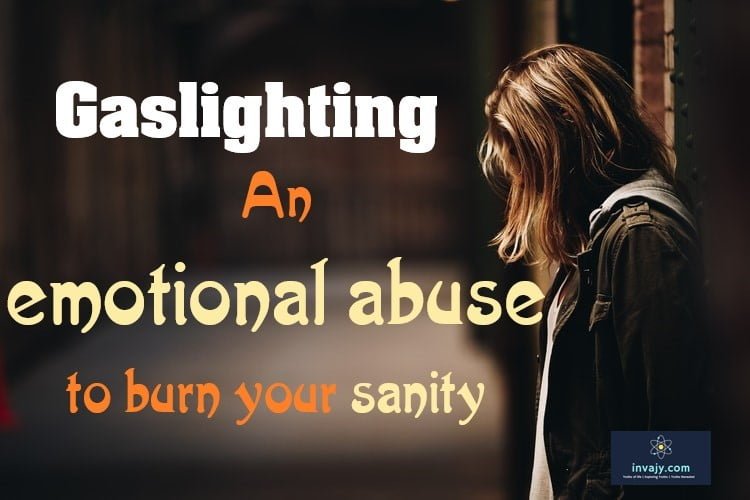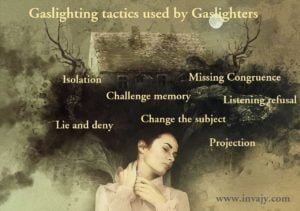Gaslighting — An Emotional Abuse to Burn Your Sanity
Gaslighting is a manipulative tactic where someone makes you doubt your own perceptions or reality. Recognize it by noting inconsistent information and trusting your instincts. Seek support to address and counteract this harmful behavior.

Gaslighting or Gaslighters… this term is being used more than ever before in clinical and research literature as well as in political commentary. The term Gaslighting is now commonly used to describe behavior that is inherently manipulative. Gaslighting is a powerful form of emotional abuse. This sophisticated emotional abuse tactic makes victims question their own sanity.
Gaslighters use this mind game to gain control over the victim. Like other types of abuse, gaslighting can turn out in all sorts of relationships, including personal, romantic, social and professional. You may find gaslighters everywhere; political leaders, social media influencer, news anchors, celebrities, neighbors, a close friend, boss, subordinates, colleagues, siblings, parents or other close relations—anyone of these people surrounding you is in the position to gaslight you.
What is Gaslighting?
Many people have heard the term gaslighting but not aware about—What is gaslighting? Let’s first understand the gaslighting meaning. Gaslighting is a form of psychological and emotional abuse used to eradicate or alter another human being’s perception of reality to gain influence, power, and control.
Gaslighting is not just lying or manipulating—it’s an intentional and systematic attempt to distort someone’s sense of reality. Gaslighters deliberately play subtle mind games and psychological manipulations; which are carried out gradually in stages. To undermine the mental stability of its victim gaslighter repeats such manipulation time after time. The goal is often to gain power and control over the victim by making them question their thoughts, memories, and even basic senses.
Over time, victims of gaslighting can lose trust in themselves and become dependent on the manipulator for “reality checks,” which deepens the manipulative hold.
Gaslighting occurs in various forms, including:
- Personal Relationships: Often between romantic partners, where one partner seeks to dominate or control the other.
- Workplace Settings: Where a superior or colleague may undermine an individual’s competence or perception of their work environment.
- Institutional Gaslighting: This occurs on a societal level when large organizations, media outlets, or political groups present information that intentionally distorts facts to maintain control.
The origin of the term Gaslighting
I know a question must be bugging you; from where did this term come from? The trendy phrase “Gaslighting” is originated from a 1938 mystery thriller play written by British playwright Patrick Hamilton called “Gas light” . It was adapted into a popular movie in 1944 ; starring Ingrid Bergman and Charles Boyer and directed by George Cukor. In this gaslighting movie, husband Gregory manipulates his innocent, loving and trusting wife Paula into believing she can no longer believe her own perceptions of reality.
Gregory tries to convince Paula through manipulating situations that she is going crazy. In one pivotal scene of this popular movie, Gregory causes the gaslights in the house to flicker by turning them on in the attic of the house. Paula notices this change asks her husband why the gaslights are flickering. Gregory convinces Paula that it’s not really happening and that it’s all in her mind, causing her to doubt her self-perception. Hence the term Gaslighting was born. This type of manipulation, where the abuser gradually makes the victim question their reality, has since become a recognized psychological tactic and a metaphor for the systematic erosion of an individual’s confidence in their own perceptions.
While the term Gaslighting never vanished, over seven decades later, gaslighting has fully resurfaced in personal relationships. The word gaslighting has become more popular everywhere since Donald Trump’s inauguration, so much so that the Oxford Dictionaries included it in one of the most popular words of 2018.
Effects of gaslighting
Galighting can have catastrophic effects on your mental health. The process is often gradual and may lead a person to develop mental health concerns. Gaslighting can impact your life in following manner:
- Chronic stress and anxiety
- Constant self-doubt
- Emotional dependency
- Cognitive dissonance
- Altered perception about reality
- No trust on own judgments
- Lack of self-confidence
- Low self-esteem
- Social isolation and withdrawal
- Decreased decision making ability
- Depression

Also Read: Narcissist quotes to help you deal with Emotional Abuse
Gaslighting Examples in a Relationship
Here are the examples of gaslighting in a relationships you must be watchful for. Narcissist or gaslighthers use these words or phrases very frequently to gaslit the victims.
- “You are upset over nothing.”
- “You need help.”
- “Don’t be so sensitive.”
- “Why are you making things up?!”
- “You are so jealous!”
- “Are you sure? You tend to have a bad memory.”
- “I was just joking.”
- “You are imagining things.”
- “There is always drama with you.”
- “It’s all in your head.”
- “Its always something with you.”
- “They are lying.”
- “I don’t have time for this.”
- “You are too sensitive/you are overreacting”
Mechanisms of Gaslighting
Gaslighting can take place in various forms. Sometimes; it involves manipulating a person’s environment behind her/his back. On some other occasions the form of psychological abuse is entirely verbal and emotional. Common techniques used by gaslighters include following manipulative actions. These are most common warning signs of gaslighting.
Lie and Exaggerate
The gaslighter begins by spreading falsehoods, exaggerating events, or outright lying to the victim. These lies can be subtle, with the manipulator insisting that a victim’s memory or perception of events is incorrect. Lie and exaggeration are the biggest weapons of gaslighters. Gaslighters lie constantantly and exxaggerate the situations repeatedly. They set up abusive pattern using these tactics. The target/victim begins to question everything and become uncertain of the simplest matters. This self doubt and confusion in victim’s mind is what all gaslighters want. The constant self doubt and confusion that the abuser has instilled leads the victim to become desperate for clarity. In most of the cases the victim tries to seek clarity from abuser only. It becomes cycle and victim become more vulnerable.
Deny When Confronted
When the victim confronts the gaslighter with evidence or questions, the gaslighter denies it. They deny the facts, realities and actual scenarios. They might say things like, “You’re imagining things,” or, “That never happened.” This deepens the victim’s self-doubt.
Projection
Projection is gaslighter’s signature technique. They are liar, cheater, manipulator and have negative mindset. Whatever the gaslighter/narcissist is or whatever he/she is doing, he/she will assign those characteristics or behaviors to you. Gaslighters uses this technique projection so often that target/victim starts trying to defend him/her; and is distracted from the gaslighter’s own behavior.

Missing Congruence
The congruence is missing in what gaslighters say and what they do. One can notice the mismatch in their words and actions. They will make promises and commitments but their words mean nothing. When it comes to action, their behavior is altogether different. They will also use compassionate words as a weapon at times to smooth over the particular situation. Then questioned for any incident, they may use words like, ” Honey, you know how much I love you. I can’t even think to hurt you like this.” These are the apologies and words which victim want to hear, but those are not authentic. When dealing with gaslighters always pay attention to their actions and not on the words.
Listening refusal
The gaslighters refuse to listen any concerns of gaslightee or pretend not to understand them. They try to make the victim feel bitter and question own sanity.
Example: “I don’t have time to listen to all this nonsense. You’re talking senseless and irrelevant things.”
Denial
Denial to the events and conversations that have happened to further discredit the victim’s memory. They literally deny about the promises and commitments made by them. In fact typical abusers may even deny making any promises to avoid the responsibility.
Example: “What are you talking about? I never promised you that.”
Challenge Memory
The gaslighter try to convince the target that their memories are wrong. They have forgotten the things and that’s why they are overreacting to an event. They challenge and question the victim’s memory. Gaslighters deny the incidents and events occurred in the way the gaslithtee remembers. They may even deny and pretend to forget incidents or events that have happened actually, this manipulation helps further question the victim’s memory. They may also create false details of the incident or event that did not occur.
Example: “You have started forgetting things. I still remember word to word conversation of that day. You never remember our conversations right.”

Change the Subject/ Diversion
Gaslighters change the subject and try to divert the target’s attention from a topic. They divert the topic by asking another question, or making a statement typically directed to challenge your thoughts. They may also twist and redirect the conversation into an argument about the person’s credibility. This way they try to touch the topic on which victim is sensitive. It leads to arguments and hot discussions.
Example: “Did you talk to your mother again last night? She’s always putting stupid ideas in your head.”
Isolation
Gasligter declare that you are crazy. They know that victim is questioning his/her sanity. As I mentioned earlier, unfortunately in most of cases the victim search for clarity in the person who is purposefully causing the confusion. Here they call victim crazy and make them to believe it. They also spread it to other people, relatives and friends that “you’re crazy”. Gaslighter spreads rumors and gossips about you to relatives, friends and other surrounding people to you. They will pretend to be worried about you and “your behavior” while subtly telling others that you seems to have mental health issues like emotionally unstable or crazy. When victim approach them (friends and relatives) for help, they does not believe him/her. They don’t take the victim seriously. This way gaslighter isolates the victim from getting help.
Gaslighters also try to isolate their victims from friends, family, or support networks, convincing the victim that those people don’t have their best interests in mind. This isolation heightens the manipulator’s control.

Use Occasional Positive Reinforcement
To keep the victim off-balance, the gaslighter may offer occasional praise or validation. This intermittent positive reinforcement makes the victim cling to hope, believing the manipulator isn’t all bad, which can strengthen emotional dependence.
Signs of Gaslighting
I have already mentioned the harmful and bad effects of gaslighting on receiver or victim. Long exposure to gaslighting triggers many mental health issues. Therefore, it becomes extremely important to recognize when you are being gaslighted. Check the following signs of gaslighting and ask yourself if any of the symptom or statements is true for your life:
- Constant Self-Doubt: You start doubting your own feelings or your sense of reality, and try to convince yourself that the gaslighter’s behaviour is not that bad or that you are being too sensitive on the issues.
- Apologizing Excessively: You often feel compelled to apologize, even for things you haven’t done or for situations that aren’t your fault. This stems from the belief that you are always in the wrong.
- Feeling Isolated: You feel increasingly isolated from friends or family, either because the gaslighter has convinced you that they are untrustworthy or because you’re embarrassed to talk about your situation. You feel lonely, powerless and trapped.
- Difficulty Making Decisions: As you lose trust in your perceptions, decision-making becomes harder. You may feel paralyzed when trying to make even small choices.You look towards your friends, partner or relatives for taking decisions for you.
- Feeling Like You’re “Crazy”: You will be told repeatedly that you’re exaggerating. Which often leads to a sense that you’re going crazy, as you start to doubt your sanity. You might wonder if you’re imagining things or overreacting.
- Confusion: There is no congruence in words and actions of your spouse, family member or friends. Their behaviour confuses you.
- Deferring to the Manipulator: You rely on the gaslighter to interpret reality for you. You might ask them if events actually happened the way you remember or trust their version over your own recollection.
- Low Self-esteem: You feel like you are having low self-esteem. A strong feeling that you are good for nothing. The thoughts like you are not “good enough” always prevails in your mind.
- Sense of Insecurity: Sense of insecurity and vulnerability, you feel like your behavior and actions will be questioned and you will look like fool in front of others.
- Fulfilling Unrealistic Demands: You try to live up to the ingenuine, unrealistic and unreasonable expectations and demands of others.
- Anxiety: You feel like something worst or terrible is about to happen whenever friends, spouse or relatives surrounds you.
How to deal with Gaslighting?
Here are the ways to deal with gaslighting
Recognize Gaslighting
The first and foremost thing is to recognize that gaslighting is happening. We have shared enough examples of narcissist’s behavior above. We have also shared signs of gaslighting in above section. you may check the mentioned signs of gaslighting and ask yourself if any of the symptom or statements is true for your life. During the conversation notice the words and phrases used by abuser. These all will help you to recognize that gaslighting is happening or not.
Reach Out for Support
Always remember you are not alone. There are people around you, who care for you and will help out you to come out of this situation. Talk to trusted friends, family, or a therapist about your situation. An outside perspective can validate your feelings and provide a reality check. You will find it extremely helpful to talk about your experiences with others. They will back you up and verify your experience of reality.
Be Aware of your Truth
Be aware and stand firm in your truth. Believe in yourself, your perceptions and self-identity. Trust on what you see, hear and feel. Gasligter can not define who you are and your reality. The main goal of gaslighter is to put in question your truth and reality. When you defuse that tactic and trust on your own opinions, thoughts and perception the abuser fails to burn your sanity.
Document Events
Keep a journal or record of events. Start recording with tiny and little details—things that You could easily miss. Thereafter, you may write down almost everything that you go through. Write about everything and anything without feeling judged. These records can help you maintain clarity and give you evidence to counteract the manipulator’s claims. This can also help you see patterns of abuse.
Be More Social
Gaslighters always try to isolate you. Try to be more social. It is of utmost importance to keep in touch with your friends and family members. Isolation and loneliness makes you more vulnerable to self-doubt. Narcissist try to convince you that in world no one other cares for your except him/her. The abuser may manipulate you to feel unlovable and not worthy resulting into cutting ties with friends and family.
Set Boundaries
Establish firm boundaries with the gaslighter. Don’t engage in arguments about what is “real” or “true” with someone who’s trying to manipulate you. In cases where gaslighting is extreme or ongoing, remove yourself from the situation. It may be necessary to cut ties with the abuser to preserve your mental health.
Seek Professional Help
Therapy can help you untangle the effects of gaslighting and rebuild your self-trust. Cognitive behavior therapy (CBT) can offer effective tools and strategies to help you regain your sense of reality, build self-esteem, and develop coping skills to counteract the manipulation. A therapist can also offer tools for setting healthy boundaries.
The more you are aware of these gaslighting techniques, the earlier you can identify them and avoid falling into the gaslighter’s trap. Are you experiencing gaslighting? Or, do you know someone else; who is? Do you have any recommendations that would help others? Please feel free to share in the comment section.







Hello, I really liked this article.. I have a question, what is it called when the person’s subconscious mind acts like a gaslighter? The inner critical self at constant war with the conscious mind and that inner critical self acts like the gaslighter.. ? The person wants to be rational but his inner critical self wins mostly..? I would be grateful for the reply. Thanks.
Thanks Avanti Srivastav for visiting InvajyC and appreciating the article on Gaslighting.
You are right, gaslighting is not always pathological gaslighting, sometimes it happens unconsciously or subconsciously also. People having antisocial personality disorder, authoritarian personality, and ego-syntonic personality also gaslight. These Narcissists and Gaslighters are not aware about their behavior towards victim and their unconscious mind rule over conscious one . The inner critical self you have mentioned is called a subpersonality – “inner critic” or “critical inner voice”.It is a well-integrated pattern of destructive thoughts toward self and others. They know it’s wrong but disliking or past experience with victim overrules the conscious mind. The another term “Shadow gaslighting” is also used when gaslighting happens subconsciously.